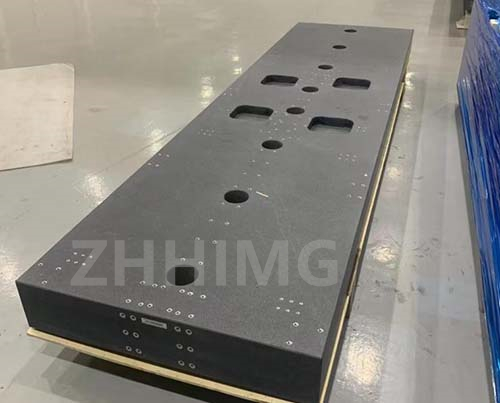Precision granite components are used extensively in precision metrology and engineering applications, thanks to their exceptional mechanical properties. They are known for being extremely strong and stiff, with low thermal expansion and excellent resistance to wear and abrasion. However, one of the lesser-known properties of precision granite components is their remarkable acid-alkali resistance.
Acid-alkali resistance is the ability of a material to resist the corrosive effects of acid and alkali solutions. In many industrial and laboratory settings, materials are exposed to a wide range of acids and alkalis in the form of cleaning and processing solutions. Materials that are not resistant to these chemicals can suffer severe damage or failure, leading to expensive repairs and downtime.
Granite is an igneous rock that is made up of interlocking crystals of minerals such as feldspar, quartz, and mica. These minerals give granite its characteristic strength and hardness, and also make it highly resistant to acid and alkali solutions. Granite is composed mainly of silicates, which are chemically stable and inert. When exposed to acid or alkali, the silicate minerals in granite do not react chemically, meaning that the material remains intact and undamaged.
The acid-alkali resistance of precision granite components is further enhanced through a variety of manufacturing processes. During the polishing process, the surface of the granite is treated with a sealing agent that improves its resistance to chemical attack. This sealant fills the microscopic pores and crevices in the surface of the granite, forming a protective barrier that prevents the acid or alkali from penetrating the material.
Another important factor that influences the acid-alkali resistance of precision granite components is their porosity. Porosity refers to the amount of open space or gaps between the grains of the granite. The lower the porosity of the granite, the lower its absorption of fluids. This is important, as any fluids that are absorbed by the granite can react with the minerals within the stone and degrade its properties. Precision granite components are manufactured with very low porosity to ensure maximum resistance to chemicals.
The acid-alkali resistance of precision granite components is an important factor for many industries that require high precision and accuracy, Such as metrology, optics, precision manufacturing, and semiconductor manufacturing. In these industries, precision is of the utmost importance. Any small changes in the properties of their equipment can have a significant impact on their results. By using precision granite components, these industries can be assured that their equipment is resistant to the corrosive effects of chemicals, leading to greater accuracy, reliability, and durability.
In conclusion, precision granite components exhibit exceptional acid-alkali resistance due to their unique composition and manufacturing processes. The acid-alkali resistance of precision granite components is one of the many factors that make them an ideal material for high-precision applications. As industries continue to seek greater precision and reliability from their equipment, precision granite components will remain a key component in their arsenal.
Post time: Mar-12-2024

